浙江201811月高考英语试题[含答案解析]
2018年浙江省高考英语试卷(含详细答案解析)
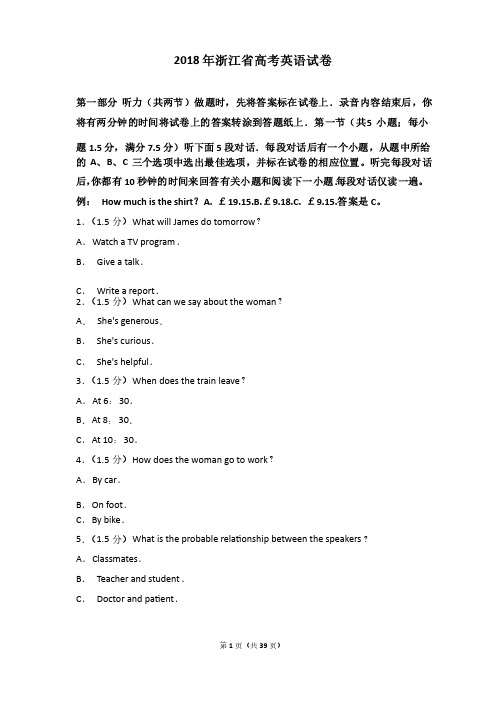
第二部分 阅读理解(共两节)第一节(共10 个小题;每小题2.5 分,满分 25.0 分)阅读下列短文,从每题所给的A、B、C 和 D 四个选项中,选出最佳选项, 并在答题纸上将该项涂黑.
(1)Which of the following best deseribes Bri sh novels in the 18th century ? A. They were difficult to understand . B. They were popular among the rich. C. They were seen as nearly worthless. D. They were wri en mostly by women .
第二节(每小题 1.5 分,满分 22.5 分)听下面 5 段对话或独白.每段对话或独 白后有几个小题,从题中所给的A、B、C 三个选项中选出最佳选项,并标在试 卷的相应位置.听每段对话或独白前,你将有时间阅读各个小题,每小题5 秒 钟;听完后,各小题给出5 秒钟的作答时间.每段对话或独白读两遍.
(2)What is the man doing for the woman? A.Looking for some local foods. B.Showing her around the seaside. C.Offering informa on about a hotel . 8.(4.5 分)听第 8 段材料,回答下列各题. (1)Where does the conversa on probably take place ? A. In an office.
2018年11月浙江高考英语真题[word版附答案]
![2018年11月浙江高考英语真题[word版附答案]](https://img.taocdn.com/s3/m/bac5fcecaa00b52acfc7ca33.png)
2018年11月浙江高考英语真题(word版附答案)2018年下半年普通高等学校招生全国统一考试英语本试题卷分选择题和非选择题两部分。
全卷共12页,选择题部分1至9页,非选择题部分10至12页。
满分150分,考试时间120分钟。
考生注意:1.答题前,请务必将自己的姓名、准考证号用黑色字迹的签字笔或钢笔分别填写在试题卷和答题纸规定的位置上。
2.答题时,请按照答题纸上“注意事项”的要求,在答题纸相应的位置上规范作答,在本试题卷上的作答一律无效。
选择题部分第一部分听力(共两节,满分30分)做题时,先将答案标在试卷上。
录音内容结束后,你将有两分钟的时间将试卷上的答案转涂到答题纸上。
第一节(共5小题;每小题1.5分,满分7.5分)听下面5段对话。
每段对话后有一个小题,从题中所给的A、B、C三个选项中选出最佳选项,并标在试卷的相应位置。
听完每段对话后,你都有10秒钟的时间来回答有关小题和阅读下一小题。
每段对话仅读一遍。
1.What does the woman want to do?A.Watch TV.B.Go for a walk.C.Access the Internet.2.Why would the woman like to have a Chinese name?A.She is taking a Chinese class.B.She will be working in China.C.She has made some Chinese friends.3.What are the speakers talking about?A.A travel plan.B.An exam result.C.A sports game.4.What has the man been doing?A.Writing something.B.Repairing his pen.C.Shopping.5.What does John suggest the woman do?A.Meet his friend.B.Ask Harry for help.C.Go to the airport with him.第二节(共15小题;每小题1.5分,满分22.5分)听下面5段对话或独白。
【试卷分析】2018年11月高考英语浙江卷7选5

2018年11月高考英语浙江卷语篇分析——七选五Some people are so rude. Who sends an e-mail or a text message that just says “Thank you”? Who leaves a voice mail message rather than texts you? Who asks for a fact easily found on the Internet? 31Maybe I’m the rude one for not appreciating life’s little courtesies (礼节). But many social norms (规范) just don’t make sense to people drowning in digital communication.Take the thank-you note. Daniel Post Senning, a coauthor of Emily Post’s Etiquette, asked, “At what point does showing appreciation outweigh the cost?”32 Think of how long it takes to listen to one of those messages. In texts, you don’t have to declare who you are or even say hello. E-mail, too, is slower than a text. The worst are those who leave a voice mail and then send an e-mail message to tell you they left a voice mail.This isn’t the first time technology has changed our manners. 33 Alexander Graham Bell, the inventor, suggested that people say, “Ahoy!” Finally, hello won out, and the victory sped up the greet ing’s use in face-to-face communications.In the age of the smart phone, there is no reason to ask once-acceptable questions about: the weather forecast, a business’s phone number, or directions to a house, a restaurant, or an office, which can be easily found on a digital map. 34 And when you answer, they respond with a thank-you e-mail.How to handle these differing standards? Easy: Consider your audience. Some people, especially older ones, appreciate a thank-you message. 35 In traditional societies, the young learn from the old. But in modern societies, the old can also learn from the young. Here’s hoping that politeness never goes out of fashion but that time-wasting forms of communication do.A. Then there is voice mail.B. Others, like me, want no reply.C. But people still ask these things.D. Don’t these people realize that they’re wasting your time?E. Won’t new technology bring about changes in our daily life?F. Face-to-face communication makes comprehension much easier.G. When the telephone was invented, people didn’t know how to greet a caller.一、主题语境:人与社会——社会服务与人际沟通二、语篇类型:议论文三、宏观分析:该语篇可以归类到“提问-回答”模式。
浙江201811月高考英语试题[含答案解析]
![浙江201811月高考英语试题[含答案解析]](https://img.taocdn.com/s3/m/eca0637883d049649a6658ab.png)
浙江省2017年H^一月英语高考试题听力部分:ACBCB/ CBABC / ACBAB / AABCA 阅读理解:AWhen I was in fourth grade, I worked part-time as a paperboy. was one of my customers.She'd watch me coming down her street, and by the time I'd biked up to her doorstep, there'd be a cold drink waiting. I'd sit and drink while she talked.talked mostly about her dead husband, "Mr. Stanley and I went shopping this morning." she'd say. The first time she said that, soda(汽水)went up my nose.I told my father how Mrs. Stanley talked as if Mr. Stanley were still alive. Dad said she was probably lonely, and that I ought to sit and listen and nod my head and smile, and maybeshe'd work it out of her system. So that's what I did, and it turned out Dad was right. After a while she seemed content to leave her husband over at the cemetery(墓地).I finally quit delivering newspapers and didn't see Mrs. Stanley for several years. Then we crossed paths at a church fund-raiser(募捐活动).She was spooning mashed potatoes and looking happy. Four years before, she'd had to offer her paperboy a drink to have someone to talk with. Now she had friends. Her husband was gone, but life went on.I live in the city now, and my paperboy is a lady named Edna with three kids.She asks me how I'm doing. When I don't say "fine", she sticks around to hear my problems. She's lived in the city most of her life, but she knows about community.Community isn't so much a place as it is a state of mind. You find it whenever people ask howyou're doing because they care, and not because they're getting paid to doso. Sometimes it's good to just smile, nod your head and listen.21. Why did soda go up the author's nose one timeA. He was talking fast.B. He was shocked.C. He was in a hurry.D. He was absent-minded.22. Why did the author sit and listen to Mrs. Stanley according to Paragraph 3A. He enjoyed the drink.B. He wanted to be helpful.C. He took the chance to rest.D. He tried to please his dad.23. Which of the following can replace the underlined phrase "work it our of her system"A. recover from her sadnessB. move out of the neighborhoodC. turn to her old friendsD. speak out about her past24. What does the author think people in a community should do A. Open up to others. B. Depend on each other.C. Pay for other's helpD. Care about one another.BIt's surprising how much simple movement of the body can affect the way we think. Usingexpansive gestures with open arms makes us feel more powerful, crossing your arms makes you more determined and lying down can bring more insights(领悟).So if moving the body can have these effects, what about the clothes we wear We're all well aware of how dressing up in different ways can make us feel more attractive, sporty or professional, depending on the clothes wewear, but can the clothes actually change cognitive (认知)performance or is it just a feelingAdamand Galinsky tested the effect of simply wearing a white lab coat on people's powers of attention. The idea is that white coats are associated with scientists, who are in turn thought to have close attention to detail.What they found was that people wearing white coats performed better than those who weren't. Indeed, they made only half as many errors as those wearing their own clothes on the Stroop Test(one way of measuing attention). The reserchrs call the effect "enclothed cognition," suggesting that all manner of different clothes probably affect our cognition in many differnt ways.This opens the way for all sorts of clothes-based experiments. Is the writer who wears a fedora more creative Is the psychologist wearing little round glasses and smoking a cigar moreinsightful Does a chef's hat makethe restaurant food taste better From now on I will only be editing artcles for PsyBlog while wearing a white coat to help keep the typing error count low. Hopefully you will be doing your part by reading PsyBlog in a cap and gown(学位®).25. What is the main idea of the textA. Body movements change the way people think.B. How people dress has an influencee on their feelings.C. What people wear can affect their cognitive performance.D. People doing different jobs should wear different clothes.26. Adam and Galinsky's experiment tested the effect of clothes on their wearers'.A. insightsB. movementsC. attentionD. appearance27. How does the author sound in the last paragraphA. Academic.B. Humorous.C. Formal.D. Hopeful.CThere are energy savings to be made from all recyclable materials, sometimes huge savings. Recycling plastics and aluminum, for instance, uses only 5% to 10% as much energy as producing new plastic or smelting (提炼)aluminum.Long before most of us even noticed what we now call "the environment," Buckminster Fuller said, "Pollution is nothing but the resources (资源)we are not harvesting. We allow them to be left around because we've been ignorant of their value." To takeone example, let's compare the throwaway economy (经济)with a recycling economy as we feed a cat for life.Say your cat weigh 5kg and eats one can of food each day. Each empty can of its food weights 40g. In a throwaway economy, you would throw away 5,475 cans over the cat's 15-year lifetime. That's 219kg of steel-more than a fifth of a ton and more than 40 times the cat's weight.In a recycling economy, we would makeone set of 100 cans to start with, then replace them over and over again with recycled cans. Since almost 3% of the metal is lost during reprocessing, we'd have to make an extra 10 cans each year. But in all, only 150 cans will be used up over the cat's lifetime-and we'll still have 100 left over for the next cat.Instead of using up 219kg of steel, we've used only 6kg. And because the process of recycling steel is less polluting than making new steel, we've also achieved the following significant savings: in energy use-47% to 74%; in air pollution-85%; in water pollution-35%; in water use-40%.28. What does Buckminster Fuller say about pollutionA. It is becoming more serious.B. It destroys the environment.C. It benefits the economy.D. It is the resources yet to be used.29. Howmany cans will be used up in a cat's 15-year lifetime in a recycling economy A. 50 B. 100C. 150D. 25030. What is the author's purpose in writing the textA. To promote the idea of recycling.B. To introduce an environmentalist.C. To discuss the causes of pollution.D. To defend the throwaway economy.How to Remember What You ReadReading is important. But the next step is making sure that you remember what you've read!__31__you may have just read the text. But the ideas, concepts and images(形象)may fly right out of your head. Here are a few tricks for remembering what you read. ・__32__If the plot, characters, or word usage is confusing for you, you likely won't be able to remember what you read. It's a bit like reading a foreign language. If you don't understand what you're reading, how would you rememberit But there are a few things you can do... Use a dictionary; look up the difficult words.• Are you connectedDoes a character remind you of a friend Does the setting make you want to visit theplace Does the book inspire you, and make you want to read more With some books, you mayfeel a connection right away. __33__ Howwilling are you to makethe connections happen・ Read it; hear it; be it!Read the lines. Then, speak them out loud. And, put some character into the words. When he was writing his novels, Charles Dickens would act out the parts of the characters. He'd make faces inthe mirror, and change his voice for each character. __34__• How often do you readIf you read frequently, you'll likely have an easier time with remembering what you' re reading and what you've read. __35__As you make reading a re gular part of your life, you'll make more connections, stay more focused and understand the text better. You ' ll learn to enjoy literature - as you remember what you read!A. Are you confusedB. Practice makes perfect.C. What's your motivationD. Memory is sometimes a tricky thing.E. Marking helps you remember what you read.F. But other books require a bit more work on your part.G. You can do the same thing when you are reading the text! 31-35 DAFGB 完型填空A young English teacher saved the lives of 30 students when he took__36__ of a bus after its driver suffered a serious heart attack. Guy Harvold,24, had __37__ the students and three course leaders from Gatwick airport, and they were travelling to Bourme mouth to __38__ their host families. They were going to __39__ a course at the ABC Language School in Bournemouth where Harvold works as a __40__.Harvold, who has not __41__ his driving test, said, "I realized the bus was out of control when I was __42__ the students." The bus ran into trees at the side of the road and he __43__the driver was slumped(倒伏)over the wheel. The driver didn't __44__. He was unconscious. Thebus__45__ a lamp post and it broke the glass on the front door before Harvold __46__ to bring the bus to a stop. Police__47__ the young teacher's quick thinking. If he hadn't __48__ quickly, there could have been a terrible__49__.The bus driver never regained consciousness and died at Easy Surrey Hospital. He had worked regulary with the __50__ and was very well regarded by the teachers and students. Harvold said, "I was __51__ that no one else was hurt, but I hoped that the driver would __52__.The head of the language school told the local newspaper that the school is going to send Harvold on a weekend __53__ to Dublin with a friend, thanking him for his __54__. A local driving school has also offered him six __55__driving lessons. 36. A. control B. care C. advantage D. note37. A. taken in B. picked up C. tracked down D. helped out38. A. greet B. thank C. invite D. meet39. A. present B. introduce C. take D. organize40. A. drive B. doctor C. librarian D. teacher41. A. given B. marked C. passed D. conducted42. A. speaking to B. waiting for C. returning to D. looking for43. A. learned B. noticed C. mentioned D. doubted44. A. sleep B. cry C. move D. recover45. A. ran over B. went by C. carried D. hit46. A. remembered B. continued C. prepared D. managed47. A. witnessed B. recorded C. praised D. understood48. A. appeared B. reacted C. escaped D. interrupted49. A. delay B. accident C. mistake D. experience50. A. airport B. hospital C. school D. police51. A. happy B. fortunate C. touched D. sorry52. A. survive B. retire C. relax D.succeed53. A. project B. trip C. dinner D. duty54. A. bravery B. skill C. quality D. knowledge55. A. necessary B. easy C. different D. free语法填空Easy Ways to Build VocabularyIt's not all that hard to build an advanced and large vocabulary. Like many things in life, it's__56__ongoing process, and the best part of the process is that there's enough room for improvement, __57__means you'll just keep getting better and better. Of course you have to work at it. You wouldn't think that a few__58__(month) of exercise in your teens would be enough __59__ the rest of your life, and that's also true for building your vocabulary--you have to keep at it daily, and pretty soon you will find that you have an excellent vocabulary.One of the __60__(effect) ways to build vocabulary is to read good books. You need to __61__(real)read at least one good book a week, preferably a classic. This isn't as hard as it __62__(sound), and it is far better than any other method because you improve your vocabulary while __63__(read) an interesting piece of literature. Another nice thing is that you learn both new words and __64__(they) use unconsciously, meaning that you will tend to use the words __65__(learn) this way in conversations almost automatically.参考答案56. an 57. which 58. months59. for 60. most effective 61. really 62. sounds 63. reading64. their ( 后面的use是名词)65. learned ( 过去分词作后置定语修饰words)【应用文写作】假如你是李华,你们学校的外教Mr. Hall寒假不回国。
201811月浙江高考英语试题答案解析及解析
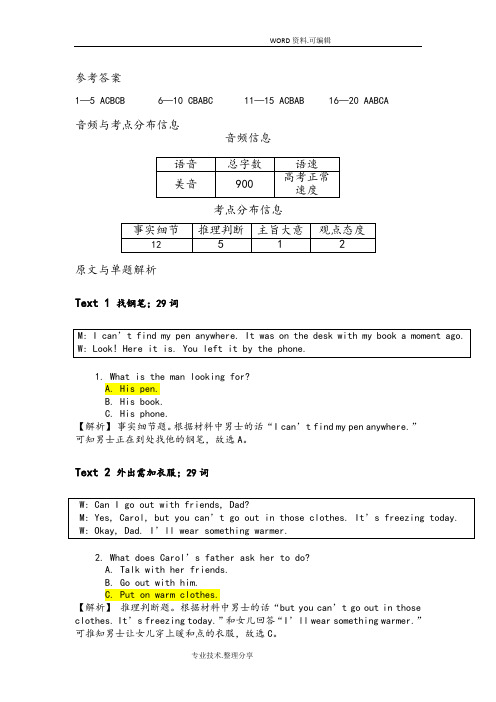
参考答案1—5 ACBCB 6—10 CBABC 11—15 ACBAB 16—20 AABCA音频与考点分布信息音频信息考点分布信息原文与单题解析Text 1 找钢笔;29词1. What is the man looking for?A. His pen.B. His book.C. His phone.【解析】事实细节题。
根据材料中男士的话“I can’t find my pen anywhere.”可知男士正在到处找他的钢笔,故选A。
Text 2 外出需加衣服;29词2. What does Carol’s father ask her to do?A. Talk with her friends.B. Go out with him.C. Put on warm clothes.【解析】推理判断题。
根据材料中男士的话“but you can’t go out in those clothes. It’s freezing today.”和女儿回答“I’ll wear something warmer.”可推知男士让女儿穿上暖和点的衣服,故选C。
Text 3 研究小组的人数;22词3. How many members are there in Alice’s group now?A. Two.B. Four.C. Six.【解析】事实细节题。
根据材料中女士的话“there were six of us to begin with. Then two people left.”可以简单地计算出女士的小组现在有4名成员,故选B。
Text 4 让孩子在厨房帮忙;40词4. What are the speakers talking about?A. Ways of cooking.B. Healthy food for kids.C. Kids helping in the kitchen.【解析】主旨大意题。
2018年11月浙江高考英语试题和答案(含听力原文)
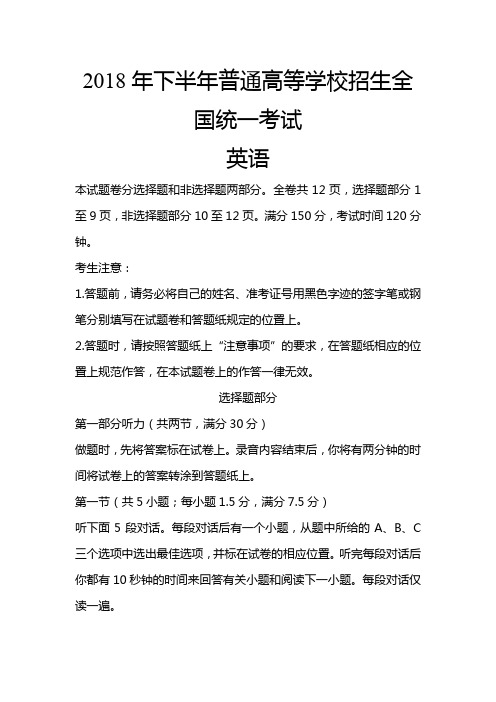
2018年下半年普通高等学校招生全国统一考试英语本试题卷分选择题和非选择题两部分。
全卷共12页,选择题部分1至9页,非选择题部分10至12页。
满分150分,考试时间120分钟。
考生注意:1.答题前,请务必将自己的姓名、准考证号用黑色字迹的签字笔或钢笔分别填写在试题卷和答题纸规定的位置上。
2.答题时,请按照答题纸上“注意事项”的要求,在答题纸相应的位置上规范作答,在本试题卷上的作答一律无效。
选择题部分第一部分听力(共两节,满分30分)做题时,先将答案标在试卷上。
录音内容结束后,你将有两分钟的时间将试卷上的答案转涂到答题纸上。
第一节(共5小题;每小题1.5分,满分7.5分)听下面5段对话。
每段对话后有一个小题,从题中所给的A、B、C 三个选项中选出最佳选项,并标在试卷的相应位置。
听完每段对话后你都有10秒钟的时间来回答有关小题和阅读下一小题。
每段对话仅读一遍。
1.What does the woman want to do?A.Watch TV.B.Go for a walk.C.Access the Internet.2.Why would the woman like to have a Chinese name?A.She is taking a Chinese class.B.She will be working in China.C.She has made some Chinese friends.3.What are the speakers talking about?A.A travel plan.B.An exam result.C.A sports game.4.What has the man been doing?A.Writing something.B.Repairing his pen.C.Shopping.5.What does John suggest the woman do?A.Meet his friend.B.Ask Harry for help.C.Go to the airport with him.第二节(共15小题;每小题1.5分,满分22.5分)听下面5段对话或独白。
【试卷分析】2018年11月高考英语浙江卷语法填空
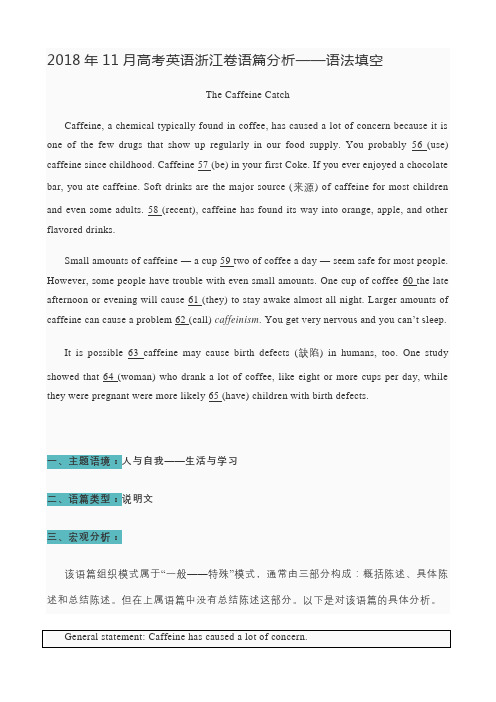
2018年11月高考英语浙江卷语篇分析——语法填空The Caffeine CatchCaffeine, a chemical typically found in coffee, has caused a lot of concern because it is one of the few drugs that show up regularly in our food supply. You probably 56 (use) caffeine since childhood. Caffeine 57 (be) in your first Coke. If you ever enjoyed a chocolate bar, you ate caffeine. Soft drinks are the major source (来源) of caffeine for most children and even some adults. 58 (recent), caffeine has found its way into orange, apple, and other flavored drinks.Small amounts of caffeine — a cup 59 two of coffee a day — seem safe for most people. However, some people have trouble with even small amounts. One cup of coffee 60 the late afternoon or evening will cause 61 (they) to stay awake almost all night. Larger amounts of caffeine can cause a problem 62 (call) caffeinism. You get very nervous and you can’t sleep.It is possible 63 caffeine may cause birth defects (缺陷) in humans, too. One study showed that 64 (woman) who drank a lot of coffee, like eight or more cups per day, while they were pregnant were more likely 65 (have) children with birth defects.一、主题语境:人与自我——生活与学习二、语篇类型:说明文三、宏观分析:该语篇组织模式属于“一般——特殊”模式,通常由三部分构成:概括陈述、具体陈述和总结陈述。
2018年高考英语全国2卷真题及答案(word版) 含写作和详细解析
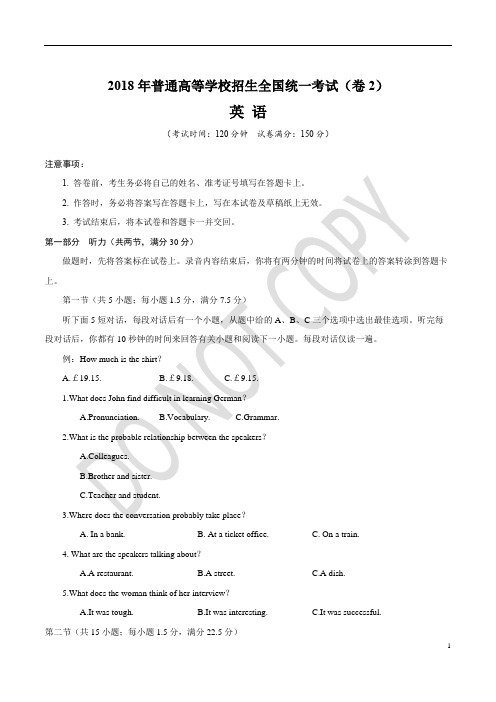
2018年普通高等学校招生全国统一考试(卷2)英语(考试时间:120分钟试卷满分:150分)注意事项:1. 答卷前,考生务必将自己的姓名、准考证号填写在答题卡上。
2. 作答时,务必将答案写在答题卡上,写在本试卷及草稿纸上无效。
3. 考试结束后,将本试卷和答题卡一并交回。
第一部分听力(共两节,满分30分)做题时,先将答案标在试卷上。
录音内容结束后,你将有两分钟的时间将试卷上的答案转涂到答题卡上。
第一节(共5小题;每小题1.5分,满分7.5分)听下面5短对话,每段对话后有一个小题,从题中给的A、B、C三个选项中选出最佳选项。
听完每段对话后,你都有10秒钟的时间来回答有关小题和阅读下一小题。
每段对话仅读一遍。
例:How much is the shirt?A.£19.15.B.£9.18.C.£9.15.1.What does John find difficult in learning German?A.Pronunciation.B.Vocabulary.C.Grammar.2.What is the probable relationship between the speakers?A.Colleagues.B.Brother and sister.C.Teacher and student.3.Where does the conversation probably take place?A. In a bank.B. At a ticket office.C. On a train.4. What are the speakers talking about?A.A restaurant.B.A street.C.A dish.5.What does the woman think of her interview?A.It was tough.B.It was interesting.C.It was successful.第二节(共15小题;每小题1.5分,满分22.5分)听下面5段对话或独白,每段对话或独白后有几个小题,从题中所给的A、B、C三个选项中选出最佳选项。
- 1、下载文档前请自行甄别文档内容的完整性,平台不提供额外的编辑、内容补充、找答案等附加服务。
- 2、"仅部分预览"的文档,不可在线预览部分如存在完整性等问题,可反馈申请退款(可完整预览的文档不适用该条件!)。
- 3、如文档侵犯您的权益,请联系客服反馈,我们会尽快为您处理(人工客服工作时间:9:00-18:30)。
浙江省2017年十一月英语高考试题听力部分:ACBCB/ CBABC / ACBAB / AABCA阅读理解:AWhen I was in fourth grade, I worked part-time as a paperboy. was one of my customers. She'd watch me coming down her street, and by the time I'd biked up to her doorstep, there'd be a cold drink waiting. I'd sit and drink while she talked.talked mostly about her dead husband, "Mr. Stanley and I went shopping this morning." she'd say. The first time she said that, soda(汽水) went up my nose.I told my father how Mrs. Stanley talked as if Mr. Stanley were still alive. Dad said she was probably lonely, and that I ought to sit and listen and nod my head and smile, and maybe she'd work it out of her system. So that's what I did, and it turned out Dad was right. After a while she seemed content to leave her husband over at the cemetery(墓地).I finally quit delivering newspapers and didn't see Mrs. Stanley for several years. Then we crossed paths at a church fund-raiser(募捐活动). She was spooning mashed potatoes and looking happy. Four years before, she'd had to offer her paperboy a drink to have someone to talk with. Now she had friends. Her husband was gone, but life went on.I live in the city now, and my paperboy is a lady named Edna with three kids. She asks me how I'm doing. When I don't say "fine", she sticks around to hear my problems. She's lived in the city most of her life, but she knows about community. Community isn't so much a place as it is a state of mind. You find it whenever people ask how you're doing because they care, and not because they're getting paid to doso. Sometimes it's good to just smile, nod your head and listen.21. Why did soda go up the author's nose one timeA. He was talking fast.B. He was shocked.C. He was in a hurry.D. He was absent-minded.22. Why did the author sit and listen to Mrs. Stanley according to Paragraph 3A. He enjoyed the drink.B. He wanted to be helpful.C. He took the chance to rest.D. He tried to please his dad.23. Which of the following can replace the underlined phrase "work it our of her system"A. recover from her sadnessB. move out of the neighborhoodC. turn to her old friendsD. speak out about her past24. What does the author think people in a community should doA. Open up to others.B. Depend on each other.It's surprising how much simple movement of the body can affect the way we think. Using expansive gestures with open arms makes us feel more powerful, crossing your arms makes you more determined and lying down can bring more insights(领悟).So if moving the body can have these effects, what about the clothes we wear We're all well aware of how dressing up in different ways can make us feel more attractive, sporty or professional, depending on the clothes we wear, but can the clothes actually change cognitive(认知) performance or is it just a feelingAdam and Galinsky tested the effect of simply wearing a white lab coat on people's powers of attention. The idea is that white coats are associated with scientists, who are in turn thought to have close attention to detail.What they found was that people wearing white coats performed better than those who weren't. Indeed, they made only half as many errors as those wearing their own clothes on the Stroop Test(one way of measuing attention). The reserchrs call the effect "enclothed cognition," suggesting that all manner of different clothes probably affect our cognition in many differnt ways.This opens the way for all sorts of clothes-based experiments. Is the writer who wears a fedora more creative Is the psychologist wearing little round glasses and smoking a cigar more insightful Does a chef's hat make the restaurant food taste better From now on I will only be editing artcles for PsyBlog while wearing a white coat to help keep the typing error count low. Hopefully you will be doing your part by reading PsyBlog in a cap and gown(学位服).25. What is the main idea of the textA. Body movements change the way people think.B. How people dress has an influencee on their feelings.C. What people wear can affect their cognitive performance.D. People doing different jobs should wear different clothes.26. Adam and Galinsky's experiment tested the effect of clothes on their wearers'______.A. insightsB. movementsC. attentionD. appearance27. How does the author sound in the last paragraphA. Academic.B. Humorous.C. Formal.D. Hopeful.CThere are energy savings to be made from all recyclable materials, sometimes huge savings. Recycling plastics and aluminum, for instance, uses only 5% to 10% as much energy as producing new plastic or smelting(提炼)aluminum.Long before most of us even noticed what we now call "the environment," Buckminster Fuller said, "Pollution is nothing but the resources(资源)we are not harvesting. We allow them to be left around because we've been ignorant of their value." To takeone example, let's compare the throwaway economy(经济)with a recycling economy as we feed a cat for life.Say your cat weigh 5kg and eats one can of food each day. Each empty can of its food weights 40g. In a throwaway economy, you would throw away 5,475 cans over the cat's 15-year lifetime. That's 219kg of steel-more than a fifth of a ton and more than 40 times the cat's weight.In a recycling economy, we would make one set of 100 cans to start with, then replace them over and over again with recycled cans. Since almost 3% of the metal is lost during reprocessing, we'd have to make an extra 10 cans each year. But in all, only 150 cans will be used up over the cat's lifetime-and we'll still have 100 left over for the next cat.Instead of using up 219kg of steel, we've used only 6kg. And because the process of recycling steel is less polluting than making new steel, we've also achieved the following significant savings: in energy use-47% to 74%; in air pollution-85%; in water pollution-35%; in water use-40%.28. What does Buckminster Fuller say about pollutionA. It is becoming more serious.B. It destroys the environment.C. It benefits the economy.D. It is the resources yet to be used.29. How many cans will be used up in a cat's 15-year lifetime in a recycling economyA. 50B. 100C. 150D. 25030. What is the author's purpose in writing the textA. To promote the idea of recycling.B. To introduce an environmentalist.C. To discuss the causes of pollution.D. To defend the throwaway economy.How to Remember What You ReadReading is important. But the next step is making sure that you remember what you've read! __31__you may have just read the text. But the ideas, concepts and images (形象)may fly right out of your head. Here are a few tricks for remembering what you read.● __32__If the plot, characters, or word usage is confusing for you, you likely won't be able to remember what you read. It's a bit like reading a foreign language. If you don't understand what you're reading, how would you remember it But there are a few things you can do... Use a dictionary; look up the difficult words.● Are you connectedDoes a character remind you of a friend Does the setting make you want to visit the place Does the book inspire you, and make you want to read more With some books, youmay feel a connection right away. __33__ How willing are you to make the connections happen● Read it; hear it; be it!Read the lines. Then, speak them out loud. And, put some character into the words. When he was writing his novels, Charles Dickens would act out the parts of the characters. He'd make faces in the mirror, and change his voice for each character. __34__● How often do you readIf you read frequently, you'll likely have an easier time with remembering what you’re reading and what you've read. __35__As you make reading a re gular part of your life, you'll make more connections, stay more focused and understand the text better. You’ll learn to enjoy literature- as you remember what you read!A. Are you confusedB. Practice makes perfect.C. What's your motivationD. Memory is sometimes a tricky thing.E. Marking helps you remember what you read.F. But other books require a bit more work on your part.G. You can do the same thing when you are reading the text!31-35 DAFGB完型填空A young English teacher saved the lives of 30 students when he took__36__ of a bus after its driver suffered a serious heart attack. Guy Harvold,24, had __37__ the students and three course leaders from Gatwick airport, and they were travelling to Bourme mouth to __38__ their host families. They were going to __39__ a course at the ABC Language School in Bournemouth where Harvold works as a __40__.Harvold, who has not __41__ his driving test, said, "I realized the bus was out of control when I was __42__ the students." The bus ran into trees at the side of the road and he __43__the driver was slumped(倒伏) over the wheel. The driver didn't __44__. He was unconscious. The bus__45__ a lamp post and it broke the glass on the front door before Harvold __46__ to bring the bus to a stop. Police__47__ the young teacher's quick thinking. If he hadn't __48__ quickly, there could have been a terrible__49__.The bus driver never regained consciousness and died at Easy Surrey Hospital. He had worked regulary with the __50__ and was very well regarded by the teachers and students. Harvold said, "I was __51__ that no one else was hurt, but I hoped that the driver would __52__.The head of the language school told the local newspaper that the school is going to send Harvold on a weekend __53__ to Dublin with a friend, thanking him for his __54__. A local driving school has also offered him six __55__driving lessons. 36. A. control B. care C. advantage D. note语法填空Easy Ways to Build VocabularyIt's not all that hard to build an advanced and large vocabulary. Like many things in life, it's __56__ongoing process, and the best part of the process is that there's enough room for improvement, __57__means you'll just keep getting better and better. Of course you have to work at it. You wouldn't think that a few __58__(month) of exercise in your teens would be enough __59__ the rest of your life, and that's also true for building your vocabulary--you have to keep at it daily, and pretty soon you will find that you have an excellent vocabulary.One of the __60__(effect) ways to build vocabulary is to read good books. You need to __61__(real) read at least one good book a week, preferably a classic. This isn't as hard as it __62__(sound), and it is far better than any other method because you improve your vocabulary while __63__(read) an interesting piece of literature. Another nice thing is that you learn both new words and __64__(they) use unconsciously, meaning that you will tend to use the words __65__(learn) this way in conversations almost automatically.参考答案56. an 57. which 58. months59. for 60. most effective 61. really 62. sounds 63. reading64. their (后面的use是名词)65. learned (过去分词作后置定语修饰words)【应用文写作】假如你是李华,你们学校的外教Mr. Hall寒假不回国。
